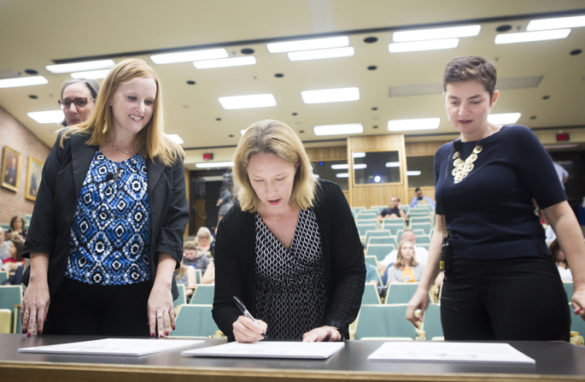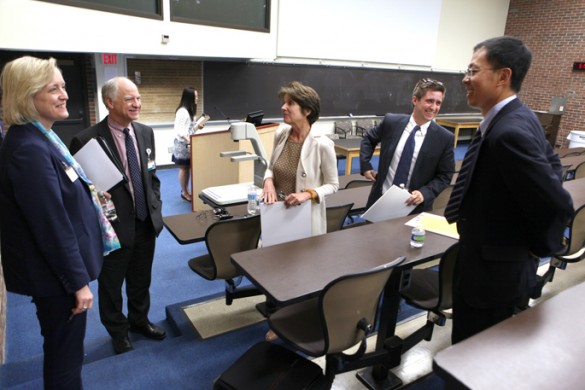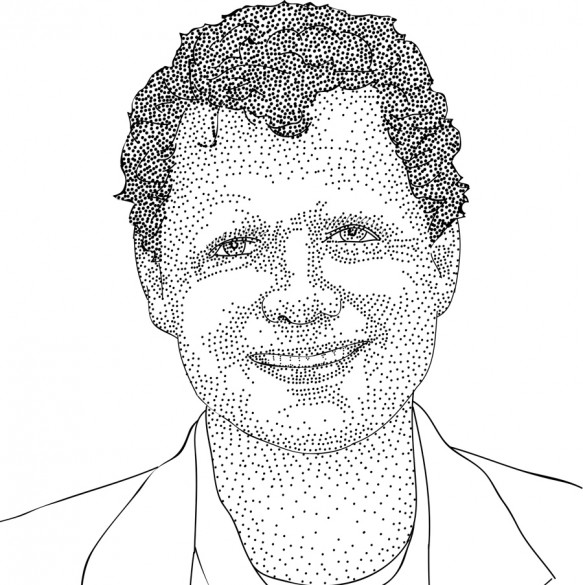
A trio of Vanderbilt University scientists described their cutting-edge investigations of cellular dynamics and cancer treatment during last week’s Flexner Discovery Lecture.
“As you know, the Flexner Discovery Lecture Series brings national leaders to Vanderbilt to share their expertise, but we also recognize that we have great expertise here at Vanderbilt as well,” said Kimryn Rathmell, M.D., Ph.D., director of the Division of Hematology and Oncology, during her opening remarks.
Marija Zanic, Ph.D., assistant professor of Cell and Developmental Biology and Chemical and Biomolecular Engineering, shared her group’s latest studies on how cells build dynamic intracellular structures, in particular microtubule-based structures.
Microtubules are biological polymers that have multiple roles, for example in intracellular transport, neuronal development, cell motility and cell division.
Zanic discussed results from recent studies focused on HSET, a microtubule-associated motor protein that is required for successful cell division in cancer cells, but not normal cells.
“If we can understand how HSET works, the hope is that we could inhibit it and specifically target cancer cells,” Zanic said.
Using interdisciplinary approaches that include biophysical microfluidics and fluorescence imaging, Zanic and her colleagues have discovered that soluble tubulin, the protein that makes up microtubules, activates the HSET motor and changes microtubule network architecture.
Lauren Parker Jackson, Ph.D., assistant professor of Biological Sciences and Biochemistry, described her team’s studies of membrane trafficking proteins in cell biology and human disease.
Trafficking pathways, Jackson said, “are really the FedEx delivery system of our cells.” Cargoes move through the cell in small membrane-bound vesicles or tubules.
Trafficking proteins are associated with a variety of genetic and acquired diseases: mutations in trafficking genes cause spastic paraplegias and neuropathies, pathways are hijacked by viruses, cargo mis-sorting drives neurodegenerative diseases and cancers result from altered trafficking protein function.
Jackson’s laboratory focuses on early events in trafficking: the assembly of vesicle “coats” and cargo recognition.
In recent studies, Jackson and her colleagues have focused on coats that include the protein AP4. Mutations in AP4 cause hereditary spastic paraplegias.
Christine Lovly, M.D., Ph.D., assistant professor of Medicine and Cancer Biology, described her role as a physician-scientist in pursuit of precision medicine for lung cancer.
Lovly shared a case report of a patient she saw during her medical oncology fellowship who had stage IV non-small cell lung cancer and progressed after four cycles of standard chemotherapy.
The Vanderbilt investigators found an ALK gene rearrangement in the patient’s tumor. The patient was started on a clinical trial of the first ALK inhibitor, crizotinib, and after six weeks, the tumor was gone.
“This is really the kind of result we want for all of our patients, and I think drilling down to the level of the tumor genomic architecture is going to help us to give these results to everybody,” Lovly said.
Lovly and her colleagues have developed a novel ALK inhibitor (ensartinib) that is now in clinical trials, and they have discovered a new mutation in ALK that underlies acquired resistance to ALK inhibitor therapy.
They are also working to understand a new gene variant they found in lung cancer, a duplication in the EGF receptor.
The lectures were sponsored by the Office of the President and CEO of Vanderbilt University Medical Center.
For a complete schedule of the Flexner Discovery Lecture series and archived video of previous lectures, go to www.mc.vanderbilt.edu/discoveryseries.















